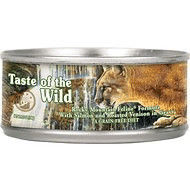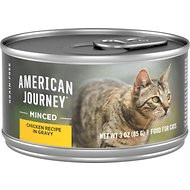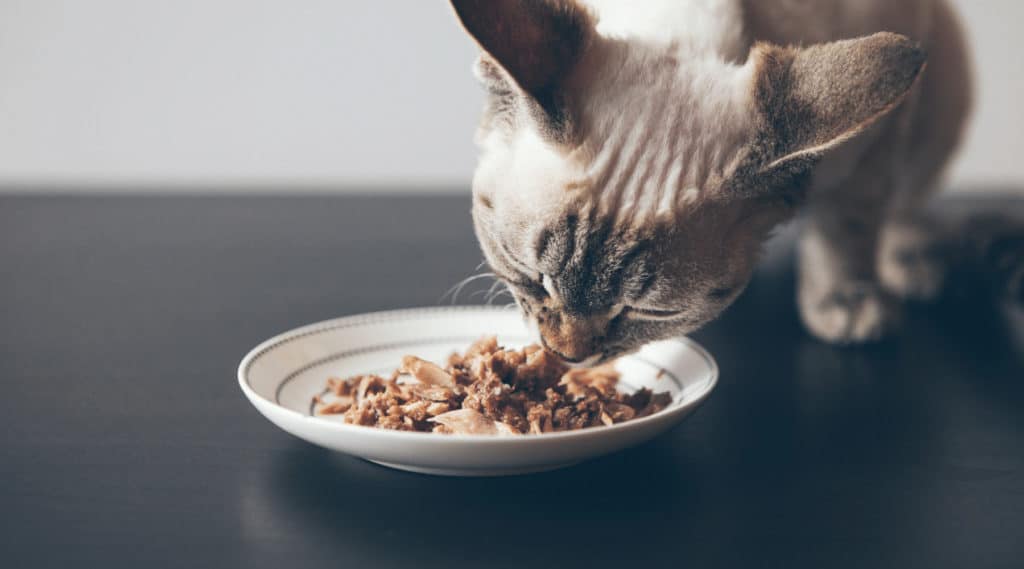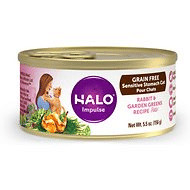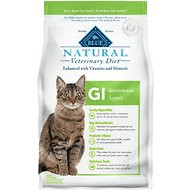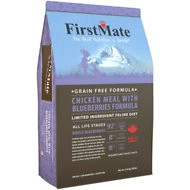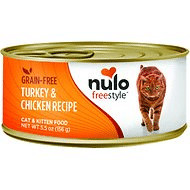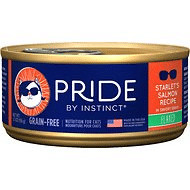Contents
- What is the Best Cat Food for Constipation?
- Understanding the Basics of Cat Constipation
- What to Look for in a Good Cat Food for Constipation
- How Do We Make Our Recommendations?
- The 9 Best Cat Food for Constipation
- Smalls Fresh Food Delivery
- Taste of the Wild Rocky Mountain Grain-Free Canned Food
- American Journey Chicken Recipe in Gravy Canned Food
- Halo Rabbit & Garden Greens Recipe Grain-Free Sensitive Stomach Canned Cat Food
- Ziwi Peak New Zealand Lamb Recipe Canned Food
- Blue Buffalo Natural Veterinary Diet GI Gastrointestinal Support
- 3 More Top-Rated Cat Foods for Constipation
- Frequently Asked Questions
If you thought about it, you could probably think of a couple of foods that affect your digestion in a negative way. Maybe you have a sensitivity to wheat or your body doesn’t particularly like dairy.
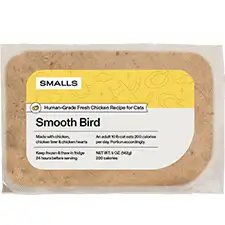
Smalls Human-Grade Ground Bird Fresh Cat Food
- Natural sources of taurine
- High in protein
Occasional digestive irregularity is something we all deal with, but it’s not typically an issue you expect in your cat. What you may not realize, however, is that constipation and digestive upset are fairly common problems in cats. The good news is that making changes to your cat’s diet could be the solution.
In this article, we’ll explore the subject of cat constipation in greater depth, talking about the symptoms, causes, and options for cat constipation remedies. You’ll also learn what to look for in a good cat food for constipation and see our top 9 picks for the best foods in this category.
What is the Best Cat Food for Constipation?
- Smalls Fresh Food Delivery
- Taste of the Wild Rocky Mountain Grain-Free Canned Food
- American Journey Chicken Recipe in Gravy Canned Food
- Halo Rabbit & Garden Greens Recipe Grain-Free Sensitive Stomach
- Ziwi Peak New Zealand Lamb Recipe Canned Food
- Blue Buffalo Natural Veterinary Diet GI Gastrointestinal Support
- FirstMate Chicken Meal with Blueberries Formula Limited Ingredient
- Nulo Freestyle Turkey & Chicken Recipe Grain-Free Canned Food
- Nature’s Variety Pride by Instinct Grain-Free Flaked Starlet’s
Understanding the Basics of Cat Constipation
Whether you’ve experienced it yourself or not, you probably already have a basic understanding of what constipation is. It is the abnormal accumulation of feces in the colon, resulting in difficult bowel movements or a lesser frequency or absence of bowel movements. The longer feces sit unpassed in the colon, the dryer and harder it becomes as the colon absorbs moisture. This makes it even harder to pass the stool and may result in straining or abdominal pain.
Here are some of the symptoms associated with constipation in cats:
- Straining to defecate
- Pain and vocalization when defecating
- Decreased thirst and appetite
- Vomiting
- Dry or very hard feces
- No stool for 48 to 72 hours
A healthy cat will pass stools at least once a day. The stool should be deep brown in color and have a solid consistency that is neither too hard nor too soft. Some odor is normal, but it shouldn’t smell overly strong or foul. If your cat stops passing stool as frequently, you may become concerned. Occasional irregularity is normal, but if you don’t notice litter box activity for four or five days you should contact your veterinarian immediately.
Here are some of the potential causes for constipation in cats:
- Over-grooming, may lead to accumulation of hair in the digestive tract
- Problems with the kidneys
- Feline megacolon, colon becomes enlarged and stops passing stool
- Intestinal blockage preventing the passage of feces
- Diet with inadequate fiber content
- Anatomical issues with the colon or tumors
- Dehydration, lack of moisture in the diet
In many cases, the cause of your cat’s constipation might not be obvious. If you haven’t already talked to your veterinarian, take your cat in for a check-up to see if your vet can diagnose the problem. It is particularly important to take your cat to the vet if he is straining to defecate, passing blood in his stool, or crying in pain when using the litter box.
When it comes to treating constipation in cats, there are a number of things you can try. Increasing your cat’s water intake is very important because dehydration can easily make constipation issues worse. Many cats don’t tend to drink water on their own, so you might need to switch to a wet food or try moistening your cat’s dry food with water or broth. If you want to encourage your cat to drink more water, try a pet fountain – cats tend to prefer running water over stagnant water.
In addition to adding more moisture to your cat’s diet, you can try over-the-counter products like laxatone, an edible petroleum gel that helps lubricate your cat’s digestive tract. Human laxatives like Miralax may work and fiber supplements like Metamucil and wheat bran can help as well. If you don’t like the idea of giving your cat something intended for humans, try adding some canned pumpkin to your cat’s food for a boost of fiber.
What to Look for in a Good Cat Food for Constipation
All cats have the same basic nutritional requirements, so it is best to start with those when shopping for cat food. Cats are obligate carnivores, so they have a biological need for meat and protein in their diet. Animal proteins like meat, poultry, and fish are the best because they contain all of the essential amino acids your cat needs and they are more biologically valuable than plant proteins.
In fact, the plant (carbohydrate) content of your cat’s food should be as low as possible. Carbohydrates do provide valuable nutrition in the form of vitamins and minerals as well as dietary fiber, but they need to come from digestible sources like whole grains, fruits, and starchy vegetables. No more than 10% of your cat’s calories should come from carbohydrates. As long as you meet your cat’s needs for animal protein, healthy fat, and essential vitamins and minerals, you have the freedom to choose whatever cat food you like. If your cat has constipation, however, there are a few additional things to look for.
Here are some additional things to look for in a good cat food for constipation:
- Highly digestible carbohydrates (in limited amounts up to 10% of calories)
- Crude fiber content between 1.4% and 3.5%, ideally
- Sources of highly fermentable fiber like gums and pectin (fruit fiber)
- Increased moisture content – consider switching to wet food
- High-quality, natural ingredients with minimal processing – no by-products or fillers
Now that you have a better understanding of what causes constipation in cats and how to address the issue with cat food, you’re almost ready to start shopping! Before you do, however, take a look at the things we look for before making a cat food recommendation.
How Do We Make Our Recommendations?
If you walk down the cat food aisle at your local pet store, are you able to tell which brands are good and which are not? To some degree, you might be able to assume that bottom-shelf products are lower in quality than top-shelf products, but not every pet store arranges their products this way.
The best thing you can do is read the information on the cat food package to determine its quality for yourself. You’ll need to understand the basics about cat nutrition and know how to read a pet food label in order to do this, however. If you’re looking for a more immediate solution, consider one of the products we recommend. But don’t just take our word for it! Take a moment to learn exactly what we look for in a good cat food before we recommend it to cat owners like you.
Here are the top things we look for in a good cat food:
- A source of high-quality animal protein as the first ingredient
- At least 30% crude protein for kittens and at least 26% for adults
- A minimum of 9% crude fat for kittens and adults
- A balance of omega-3 and omega-6 fatty acids, primarily from animal sources
- A rich blend of nutrients from natural sources and supplements, as needed
- Limited carbohydrate content from digestible sources (like whole grains and veggies)
- No low-quality fillers, by-products, or artificial additives (preservatives, dyes, or flavors)
Remember that every cat is different, so the choice that is best for one cat might not be right for yours. We encourage you to do your own research so you can better understand your cat’s individual nutritional requirements and don’t hesitate to involve your veterinarian in the decision. If you do decide to switch to another food, be sure to transition your cat onto it slowly to avoid further digestive upset.
The 9 Best Cat Food for Constipation
Now that you have a better understanding of how your cat’s digestion works and what causes constipation, you’re ready to start shopping for a better cat food. In addition to looking for higher fiber content, you also need to make sure the recipe meets your cat’s nutritional requirements, so don’t forget about the things we mentioned above. If you’re still not sure where to start, try one of our top 9 picks for the best cat food for constipation.
Here’s our top pick for the best cat food for constipation:
| Our 2024 Picks: Overall Best Foods for Constipation | |||
Smalls Fresh Cat Food
|
CHECK PRICE | ||
Taste Of The Wild Rocky Mountain Grain-Free
|
CHECK PRICE | ||
American Journey Chicken Recipe In Gravy Canned Food
|
CHECK PRICE | ||
Halo Rabbit & Garden Greens Recipe Grain-Free
|
CHECK PRICE | ||
Ziwi Peak New Zealand Lamb Recipe
|
CHECK PRICE | ||
Blue Buffalo Natural Veterinary Diet GI
|
CHECK PRICE | ||
FirstMate Chicken Meal With Blueberries Formula
|
CHECK PRICE | ||
Nulo Freestyle Turkey & Chicken Recipe
|
CHECK PRICE | ||
Nature’s Variety Pride By Instinct Grain-Free
|
CHECK PRICE | ||
Smalls Fresh Food Delivery
Overall Best Cat Food for Constipation: When it comes to cat food for constipation, moisture content is very important. For this reason, many pet owners consider switching their cats to raw food, but a raw food diet for cats can be expensive and difficult to maintain. If you want something that offers excellent nutritional quality and high digestibility, consider Smalls. This is a fresh pet food company that delivers pre-portioned packages of fresh cat food right to your door. After you provide key information about your cat’s age and weight, they calculate his nutrient and calorie needs and send you the exact right amount of food with detailed feeding instructions. Choose from two recipes, each featuring a premium source of animal protein as the main ingredient with other whole foods including fiber-rich fruits and veggies. Both recipes provide complete and balanced nutrition for cats in all life stages as well, so it is perfect for kittens as well as adult cats – you never have to change your cat’s diet again!
- Pros: High-quality natural ingredients, real protein comes first, digestible fruits and veggies for fiber, complete and balanced for all life stages, high in moisture content
- Cons: Significantly more expensive than dry food, only two recipes to choose from
Taste of the Wild Rocky Mountain Grain-Free Canned Food
Most Popular Cat Food for Constipation: Because there are so many different brands of cat food out there, it can be difficult to choose one. If you’re really not sure what to get, you can always go with a popular brand like Taste of the Wild. We recommend Taste of the Wild Rocky Mountain Grain-Free Canned Cat Food for constipation because it is made with highly digestible, natural ingredients and contains plenty of fiber and moisture. This formula features fresh salmon as the first ingredient and includes other supplemental source of premium animal protein like roasted venison and ocean fish. Fresh fruits and vegetables provide natural sources for key vitamins and minerals, though the recipe is also fortified with supplements including chelated minerals for optimal nutrient absorption. This recipe contains no grains, fillers, or by-products and it is free from artificial additives. Overall, it provides 82% moisture and, measured as dry matter, it contains 44% crude protein and 17% crude fat with 8% fiber.
- Pros: Protein-rich salmon as first ingredient, several supplemental sources of protein, rich in moisture and dietary fiber, fresh fruits and vegetables, chelated mineral supplements
- Cons: May be too high in fiber for some cats, contains some plant proteins (peas, pea flour)
American Journey Chicken Recipe in Gravy Canned Food
Most Affordable Cat Food for Constipation: High-quality cat food can be very expensive, but you don’t necessarily need to spend a fortune on a decent cat food. We recommend American Journey Chicken Recipe in Gravy Canned Cat Food for constipation because it is affordable but still contains high-quality ingredients. This recipe starts with fresh chicken as the first ingredient, a high-quality source of premium animal protein. Next comes chicken broth and turkey broth for natural flavor and high moisture content. You’ll also find supplemental proteins like chicken liver and eggs with a blend of omega-3 and omega-6 fatty acids from sunflower oil and fish oil. This recipe contains fresh fruits and vegetables as natural sources for key nutrients in addition to providing highly digestible carbohydrates and fermentable sources of fiber. Overall, this recipe contains 82% moisture with 50% crude protein and 22% fat, as dry matter basis.
- Pros: Affordable price tag, rich in premium animal proteins, highly digestible natural ingredients, rich in moisture and dietary fiber, fresh fruits and vegetables, chelated mineral supplements
- Cons: Main source of fat is plant-based (sunflower oil), contains some plant protein (peas and flaxseed)
Halo Rabbit & Garden Greens Recipe Grain-Free Sensitive Stomach Canned Cat Food
Best Cat Food for Constipation and Sensitive Stomach: If you’re looking for a high fiber wet cat food for constipation that is gentle on your cat’s sensitive stomach, try Halo Rabbit & Garden Greens Recipe Grain-Free Sensitive Stomach Canned Cat Food. This recipe features fresh rabbit as the main ingredient, a rich source of novel animal protein. It also contains fresh chicken, chicken liver, and eggs for supplemental sources of protein. This recipe is entirely grain-free, relying on highly digestible carbohydrates like barley grass and dandelion greens. Complete and balanced with all of the nutrients your cat needs, this recipe is also formulated for sensitive stomachs. It contains novel proteins and non-GMO ingredients and is completely free from grains, by-products, and artificial additives. Plus, it is rich in moisture and loaded with real meat flavor. Overall, this recipe contains 78% moisture with 50% crude protein and nearly 30% crude fat, measured as dry matter basis.
- Pros: Real rabbit as first ingredient, several supplemental proteins, digestible grain-free carbohydrates, rich in moisture and dietary fiber, chelated mineral supplements, non-GMO ingredients
- Cons: Not a single-source protein recipe
Ziwi Peak New Zealand Lamb Recipe Canned Food
Best Canned Cat Food for Constipation: If you’re looking for the best canned cat food for constipation, we recommend Ziwi Peak New Zealand Lamb Recipe Canned Food. This formula features 100% single sourced, free-range lamb as the main ingredient. This lamb is packed with protein and natural flavor but is completely free from antibiotics and growth hormones. This is a limited ingredient formula as well, which improved digestibility and it contains very limited carbohydrate content. You’ll find that this recipe contains highly nutritious ingredients like lamb organs and New Zealand green mussels as well as chelated minerals to ensure optimal nutrient absorption. Measured by dry matter, this formula contains 78% moisture with 43% crude protein and 27% crude fat. It also contains 2% crude fiber to help with constipation.
- Pros: Made with single-source free-range lamb, very high in protein low in carbohydrates, highly digestible formula, rich in moisture and fiber for digestion, chelated mineral supplements
- Cons: More expensive than average canned food, not made in the USA
Blue Buffalo Natural Veterinary Diet GI Gastrointestinal Support
Best Dry Cat Food for Constipation: If your cat suffers from frequent constipation, a canned food diet can boost his moisture intake. Unfortunately, some cats simply seem to prefer dry food. If your cat only likes dry food but has frequent digestive issues, try Blue Buffalo Natural Veterinary Diet GI Gastrointestinal Support. This recipe is vet-recommended and specifically formulated to support digestive issues. It contains only high-quality, natural ingredients to boost digestibility and more than meets your cat’s requirements for high-quality animal protein and healthy fats. This recipe contains fresh chicken and chicken meal as the top two ingredients with digestible grain-free carbohydrates like tapioca starch, peas, and flaxseed. You’ll also find several fresh fruits and vegetables to provide natural sources for key nutrients as well as dietary fiber. Overall, this food provides 36% crude protein, 14% crude fat, 5% crude fiber, and 10% moisture.
- Pros: Vet-recommended for digestive issues, high-quality natural ingredients, rich in animal protein, digestible grain-free carbohydrates, fresh fruits and vegetables, probiotics and chelated minerals
- Cons: Contains some plant protein (pea protein), may be too high in fiber for some
3 More Top-Rated Cat Foods for Constipation
We heartily recommend the six brands reviewed above, but we understand that you may have your own preferences when it comes to cat food. Here are three more options you might consider:
FirstMate Chicken Meal with Blueberries Formula Limited Ingredient Diet
If you prefer to feed your cat dry food, you should at least choose a recipe that is highly digestible – that means high-quality, natural ingredients and, ideally, a limited number of them. This FirstMate Chicken Meal with Blueberries Formula LID is a great option because it contains 92% protein from chicken meal, making it a very high-protein, low-carbohydrate diet. Chicken meal is a highly concentrated source of animal protein, contributing to the recipe’s total crude protein content of 36%. This recipe also contains chicken fat as a nutritious source of essential fatty acids (crude fat 16%). The only other ingredients aside from supplements are potato and whole blueberries. The fiber content of this recipe is 4% which might be a little high for some cats, but it is only slightly above the 3.5% recommendation, so it may be perfectly fine for cats suffering from constipation.
- Pros: 92% protein from chicken meal, chicken fat as nutritious source of fatty acids, highly digestible carbohydrates, limited number of ingredients, rich in dietary fiber, chelated minerals
- Cons: May be just a little high in fiber, significantly more expensive than the average kibble
Nulo Freestyle Turkey & Chicken Recipe Grain-Free Canned Food
Finding the perfect cat food for your cat is tough, so the last thing you want to do is find the right recipe for your kitten and then have to change diets again in a few months. This Nulo Freestyle Turkey & Chicken Recipe Grain-Free Canned Food is formulated for both adult cats and kittens, so you can feed it to your cat throughout his whole life. As a canned food, this recipe has a very high moisture content (78%) and it is rich in real animal protein as well (50% dry matter). The main ingredient is fresh turkey which is followed immediately by fresh chicken and turkey liver. This recipe also contains turkey broth for moisture and natural flavor, and it has guar gum, cranberries, pumpkin, and tomato as natural sources of dietary fiber and digestible carbohydrates. You’ll also find that this recipe is complete and balanced with the help of nutrient supplements and it is free from by-products, fillers, and grains.
- Pros: Formulated for kittens and adults, rich in real animal protein, digestible grain-free carbohydrates, rich in fiber, high in moisture content (78%), chelated mineral supplements
- Cons: A little more expensive than average wet food
Nature’s Variety Pride by Instinct Grain-Free Flaked Starlet’s Salmon Recipe Canned Food
Another nutritious option in wet food for cats is this Nature’s Variety Pride by Instinct Grain-Free Flaked Starlet’s Salmon Recipe Canned Food. It features salmon broth as the first ingredient to ensure high moisture content as well as natural fish flavor. The main protein is fresh salmon, though this recipe also includes fresh chicken, chicken liver, and egg whites as supplemental sources of protein. Ground flaxseed is the primary source of fat which is rich in omega fatty acids, helping support your cat’s skin and coat as well as regulating his digestion. You’ll also find several sources of natural, highly fermentable fiber at the end of the ingredients list, including cranberries, pumpkin, tomato, and blueberries. Overall, this recipe contains 80% moisture and provides 50% crude protein and 20% crude fat.
- Pros: Rich in real animal protein, high in moisture content, several sources of protein, blend of omega fatty acids, chelated mineral supplements, rich in dietary fiber from natural sources
- Cons: Main source of fat is plant-based (flaxseed)
Frequently Asked Questions
- What causes cat constipation? – There are a number of different things that can contribute to cat constipation, but low fiber intake and low moisture intake are two of the most common. Other potential causes include over-grooming (the accumulation of hair in the digestive tract), an intestinal obstruction, kidney problems, and a condition called feline megacolon.
- What are the best cat constipation remedies? – If you’re looking for the best cat constipation remedies you can try without an expensive visit to the vet, you have a number of options. To start off simply, try a gentle solution like canned pumpkin – it adds both fiber and moisture to your cat’s diet which may help relieve occasional constipation. If that doesn’t work, other over-the-counter solutions like Metamucil powder or Miralax could work. If you want something specifically designed for cats, try laxatone, an edible petroleum gel that lubricates your cat’s digestive tract to help move things along.
- How much dietary fiber do cats need? – Cats are carnivores by nature, so the carbohydrate content of their diets should be very limited. Though you shouldn’t look for a cat food filled with grains and veggies (beyond the amount needed to ensure complete and balanced nutrition), you should look for a certain fiber content. Research conducted by the IAMS Company shows that a fiber content between 1.4% and 3.5% is ideal for cats. This level is sufficient to support healthy digestion and optimal nutrient breakdown.
- Can you give a cat too much fiber? – Fiber is a beneficial addition to cat food, but only in limited amounts. Anything above 3.5% crude fiber has the potential to have the opposite of the desired effect – making food harder to digest and interfering with nutrient absorption. In addition to avoiding giving your cat too much fiber, you may always want to keep an eye on the type of fiber you give him. Fermentability is an important characteristic of fiber because it determines how well the beneficial bacteria in your cat’s cut can break it down. Avoid things like cellulose because they are poorly fermentable. Moderately fermentable fibers include beet pulp and highly fermentable options include gums and pectin.
- Can you give a cat Miralax or other human laxatives? – Yes, you can give your cat small amounts of human laxatives and fiber supplements to help relieve occasional constipation. If constipation becomes a recurring issue, however, you should talk to your veterinarian to determine the underlying cause of the issue. Miralax is a stool softener and laxative that you can give to cats in a dose of about ¼ teaspoon per day, mixed into wet food. Dietary fiber supplements like Metamucil and wheat bran might work as well. Mix 1 to 4 teaspoons Metamucil into your cat’s food every 12 to 24 hours or 1 to 2 tablespoons of wheat bran.
Constipation in cats is not a life-threatening problem, but it can lead to complications in addition to being an unpleasant experience for your cat. If cat constipation is a frequent issue, take what you’ve learned here and consider switching your cat’s diet. Be sure to talk to your veterinarian before making any significant changes and for help diagnosing the underlying cause of your cat’s digestive issues.

